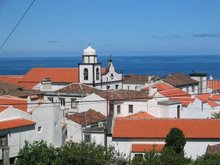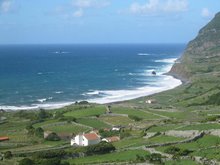It means "summer flies" and is the expression on this island (and other Azorean islands I expect) for North Americans, mostly retired, of Florentine birth or ancestry who come "home" for a month or two in the summer.
It's another of these signs of the progress of the seasons, like the first cagarro of spring, when we're walking up from the shop and pass an old gent on the street - or gathered with the local old gents in the bus shelter on the village square or an additional member of the domino school in the garage - and Carol says sotto voce "I don't recognise him". To which I answer, equally sotto voce, "Must be a mosca" or "Don't you remember? That's the mosca who's so and so's uncle who stayed in such and such a house last year". In fact it would be good if we could carry on the whole conversation in Italian because moscas de verão all, of course, speak English, often with the broadest Tony Soprano "Noo Joysey" accents. They are immediately recognisable by the mandatory baseball cap.
It's another of these signs of the progress of the seasons, like the first cagarro of spring, when we're walking up from the shop and pass an old gent on the street - or gathered with the local old gents in the bus shelter on the village square or an additional member of the domino school in the garage - and Carol says sotto voce "I don't recognise him". To which I answer, equally sotto voce, "Must be a mosca" or "Don't you remember? That's the mosca who's so and so's uncle who stayed in such and such a house last year". In fact it would be good if we could carry on the whole conversation in Italian because moscas de verão all, of course, speak English, often with the broadest Tony Soprano "Noo Joysey" accents. They are immediately recognisable by the mandatory baseball cap.

One amusing aspect of the summer influx of North Americans is the sveltely gorgeous tanned blonde teenage grand-daughters who come as part of the extended family group. You see them in the bar in the evening pointedly sitting at a different table from their parents and grandparents, the girls speaking in English while the older generations speak Portuguese. As they swirl their great manes of hair around Miss Piggy-style, you can tell they're not wowed by the court being paid to them by their local male second cousins (another fly analogy springs to mind) and that Flores was not their first choice of holiday destination. I don't know about Californians but, in a British context, it's the equivalent of a 17 year old being told she's going to Iona with her grandparents rather than Ibiza with her mates.

There are many houses in Faja Grande which are second homes belonging to emigrés only ever occupied for a few weeks in summer. Where I come from, this sort of second home ownership in rural areas is becoming about as socially acceptable as drinking and driving because it prices locals out of the housing market. But not on Flores where the second/holiday home market barely exists. There are many more empty houses, abandoned by emigration: there's no other market for the houses in a shrinking population so they just chucked the keys in a ditch.
Hence why I say Flores is like one of the islands off the west coast of Scotland about 40-50 years ago. Back then, people were emigrating from, say, the Isle of Skye in droves leaving their houses empty with no other market for them. But nowadays even the most basic cottage on Skye commands a six figure sum due to the second home market: that syndrome doesn't exist on Flores due to its isolation (whereas there's a bridge to Skye now). Hence on Flores (c.f. Skye) there's absolutely no animosity at all towards moscas de verão or other "white settlers" like us: quite the contrary as they keep a house wind and watertight and give the local builders a bit of work as most of the summer visitors get something done to the house each year to improve next year's visit.

I'm asked why people emigrated from Flores. Same reason as anywhere - poverty, lack of resources, better opportunities overseas. Faja Grande looks beautiful but there was no road here until the 1960s: the first car came to Flores in 1949 but there were only a few hundred metres of road in Santa Cruz it could drive on. There was a famine on this island in the late 1930s: American emigrés bought food and sent it on chartered ships to prevent the islanders from starving. There was no airport till the 1960s and no pier a ship delivering heavy supplies could get alongside until the 1990s. No surprise so many young people emigrated to North America in the 50s and 60s: you can't live on beautiful scenery. These people are now, of course, retired and, with the infrastructural improvements of the last couple of decades, Flores has become an easier (slightly!) and more desirable place to visit: they - with their children and grandchildren - are the moscas de verão.





3 comments:
There's much I could add to this, but for lack of time and depleted energy so late at night. I do wonder, however, if the folks you describe as having "New Joysey" accents are actually part of the Azorean diaspora that's settled around Newark, New Jersey.
I ask this only because the Boston-New Bedford-Providence nexus in SE New England has a huge Azor-American population, and a lot of Florentinos flock to the Boston suburb of Stoughton, Massachusetts. I confess that to my California-bred ears, Eastern US accents can sound somewhat alike (although I'm sure Easterners would take exception to such a cavalier lack of discernment on my part).
However, I did want to mention that the expression "moscas de verão" -- "summer flies" (uncomplimentarily characterizing North American visitors whose families have local roots in the Azores) -- is by no means unique to Flores. I first encountered it in late 2004 while Diniz Borges and I were translating Álamo Oliveira's iconic novel of Azorean emigration "I No Longer Like Chocolates."
In the book, the family at the center of the story (much like Álamo's own parents and siblings) came to the US from a village on Terceira (doubtless very similar to Álamo's hometown of Raminho, in the NW corner of that island). Here Álamo describes the parents' second vacation back in the Azores in 1975, 20 years after they emigrated and 15 years after their first vacation visit:
"The only thing she did not understand -- and it infuriated [her husband] so much -- was why they were now called 'summer flies.' A saudade that they had so sorrowfully nurtured did not deserve to be dismissed like a plague of insects" (p. 150).
(I assume you're familiar with the word "saudade," an untranslatable term for that ineffable, heart-rending longing that the Portuguese harbor, orders of magnitude beyond garden-variety nostalgia)
I suspect the expression "summer flies," like the phenomenon itself, is common not only on Flores and Terceira but throughout the entire archipelago. FWIW, I happen to know quite a number of "summer flies," mainly from California (though also a few from New England and Canada), and most are lovely folks who would likely enjoy meeting you, and vice versa :-) Perhaps you can drop by this weekend's Festa in Fazenda das Lajes to meet a few of the visitors.
P.S. Have you ever met Diana and her family from Canada, whom I mentioned to you before in a private communication?
To my untutored British ear, and never having been there, there are only four American accents:-
1. North East - what I describe as "Noo Joysey"
2. Southern
3. Canadian - the shibboleth being the "ou" diphthong: Canadians pronounce "out" as "oat" rather than "owt".
4. Everywhere else - I call that Californian.
BTW, I've never regarded the expression moscas de verao/summerflies as being in any way uncomplimentary and how strange the character in your book should equate it with a "bad thing" like a plague of insects. I've always had in my minds eye the sort of harmless benign insects that hover soundlessly over long grass by a riverbank on a hot summer evening as the sun's setting ("I'd like to buy the world a Coke" type weather.) The sort of insect a trout jumps out the water to catch. A nice insect.
It's strange how people interpret things in different ways. The plague of insects version has spoilt the illusion for me now and I shall be more circumspect about the use of the expression MdV in future.
PS - the sveltely gorgeous teenaged girls arrived today - coincidence!
Post a Comment